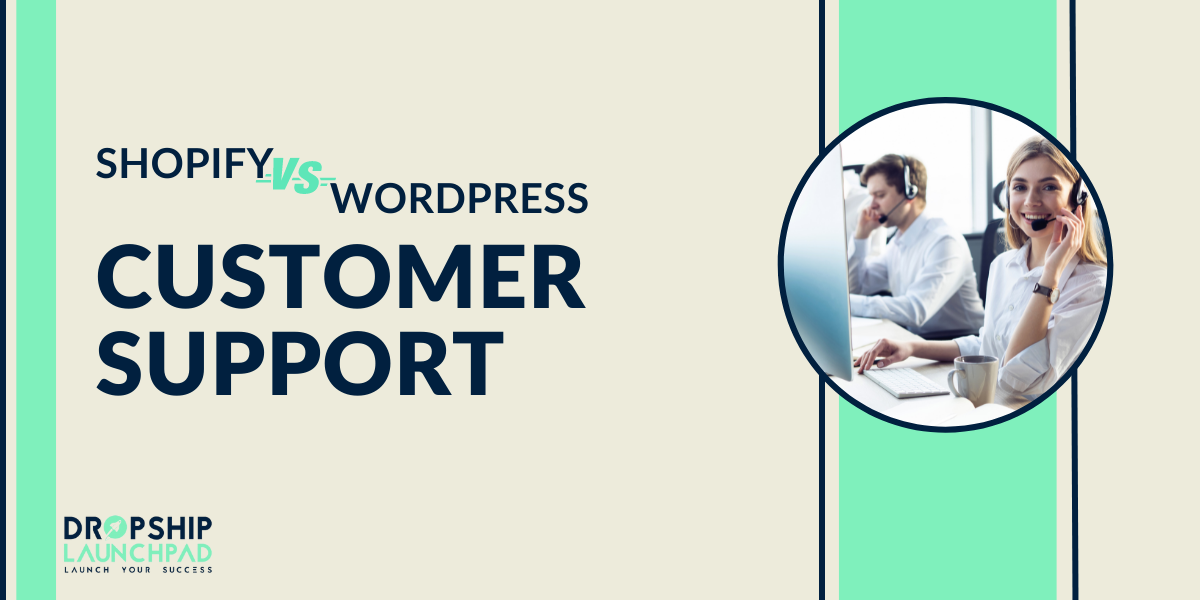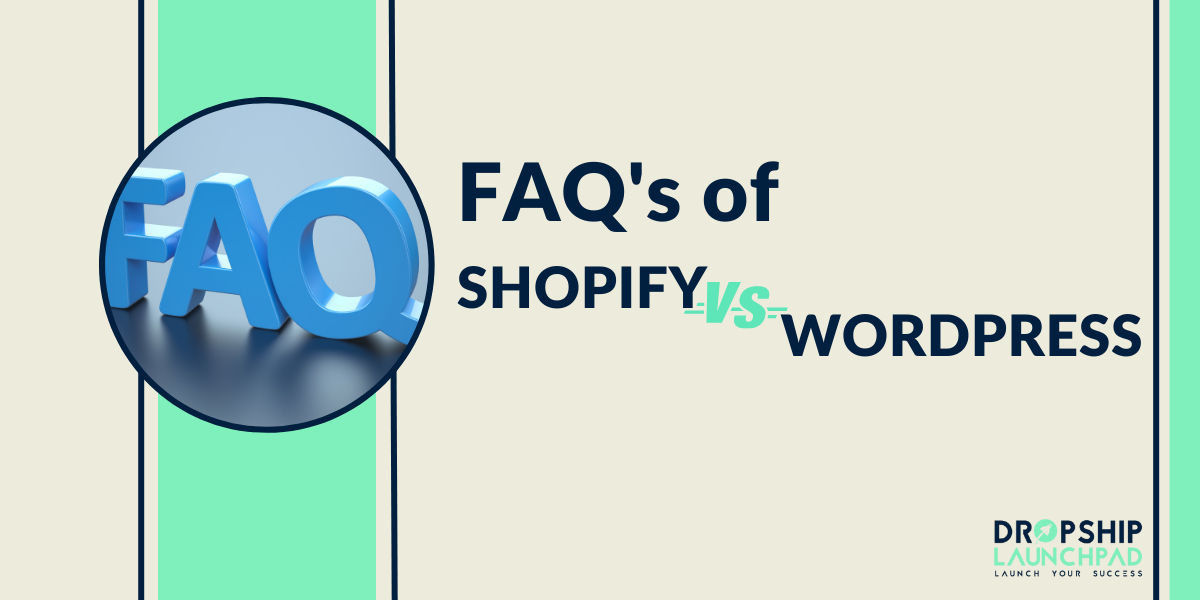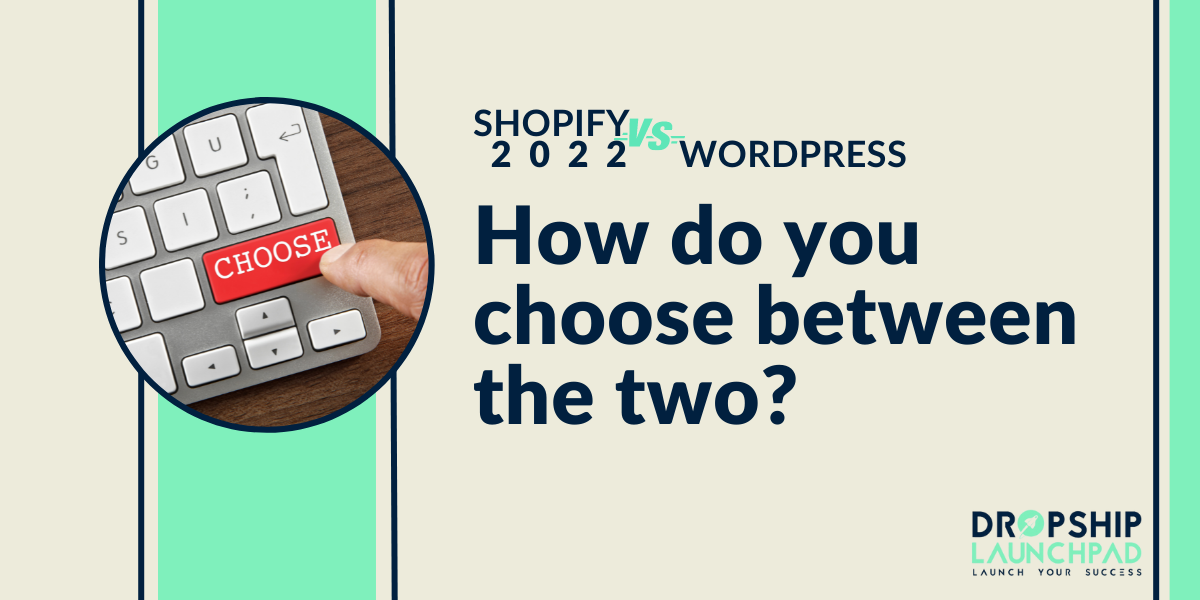Deciding between Shopify and WordPress can be difficult. Each platform has its pros and cons, and what works best for your business will ultimately determine which platform works best for you.
In this blog post, we will go through the Shopify vs WordPress comparison in terms of features, ease of use, pricing, and scalability to help you make the right decision for your eCommerce store.
Shopify Vs WordPress: What are they?

Shopify eCommerce website builder is a complete eCommerce solution that allows you to create an online store to sell your products. It’s easy to use, has built-in hosting, and offers all the eCommerce features and integrations.
Read How does Shopify Work: Essential Information for 2022
Shopify is an excellent option for those who don’t have any technical or design skills because you can create your store with little effort on their end. However, if someone knows how to code, they’ll be able to customize the HTML/CSS of their site more extensively than before!

WordPress, a content management system (CMS) that can be used to develop a simple blog to build a complex eCommerce website. You can use WordPress for free, but you have to set up your hosting and domain name.
Shopify vs WordPress: what are the differences?

Now that we’ve covered the basics of Shopify and WordPress let’s look at the key differences between these two platforms.
Shopify is a closed platform, that means Shopify itself controls it. This gives Shopify more control over security and updates.
Conversely, WordPress is an open-source platform, which means that it’s developed by a community of developers and is not controlled by any one company. This gives you more flexibility and control over your website, which means that you’re responsible for managing updates and security.
Shopify is a SaaS tool (software as a service) — you don’t own a copy of the software but pay a monthly fee to use it instead.
Shopify Vs WordPress: Pricing

Shopify has a few different plans, but their basic plan starts with
- A free trial for 14 days.
- $29/month- Basic Shopify plan.
- $79/month- Shopify plan.
- $299/month- Advanced Shopify plan.
- Shopify plus starts from $2000.
- Shopify lite-$9 per month.
You’ll be charged a transaction fee if you want to use third-party payments than their in-house payment processing system.
Start your Shopify store now!
Basic ($6.99 per month)
Basic Shopify is an excellent option for those who want to start their eCommerce store without having too many obligations. You’ll get all the essential features and two stuff accounts with the plan!
- An e-commerce store engine provides users, and customers access to your items through browsing or searching.
- There are a variety of user interfaces designed to make it easier for users to operate an online store.
Shopify ($79 per month)
The premium Shopify plan is the best option for businesses looking to take their eCommerce store up a notch. You will get everything with the basic offering, plus five staff accounts and standard reporting!
Shopify Advanced ($299 per month)
Shopify advanced is the perfect plan for businesses looking to scale their eCommerce operations. It gives you everything found in basic and standard plans, plus 15 staff accounts with advanced reporting tools that will allow you to make better decisions about what needs attention first!
This service also includes fraud analysis, so these entrepreneurs don’t get caught off guard by any problems as soon as they arise.
Shopify Plus (Start from $2000 per month)
Shopify Plus is Shopify’s premium eCommerce platform for businesses. Shopify Plus is a fully-managed platform that gives you everything you need to run your million-dollar business at scale.
Lite Plan ( $19 per month)
The Shopify Lite plan is ideal for individuals or organizations who want to use their existing website or blog as a starting point.
Shopify offers a Shopify eCommerce plugin that allows you to add Shopify buy buttons to any website or blog. An easy-to-use user interface will enable you to handle everything about running an internet store from one location.
Read Shopify Startup Costs: How Much $$ Will I Have to Pay?
WordPress pricing

There are two plans available in WordPress.
- $5 WordPress Starter plan.
- $15 WordPress pro plan
Starter plan:
A starter plan is a basic plan that comes with a custom domain name, 6 GB storage, Google analytic integration, and collect payment.
WordPress pro plan:
WordPress pro comes with all the basic plan features and WordPress plugin, premium support, premium theme, and sell product with WooCommerce.
However, you have to pay for hosting, which starts at around $25 per month, and a domain name, which will cost you approximately $15 per year.
Shopify Vs WordPress: Pros and cons

Shopify Pros:
- Shopify is a closed platform, Shopify itself controls it. This gives Shopify more control over security and updates.
- You don’t own a copy of the Shopify software but pay a monthly fee to use it instead. This makes Shopify more expensive in the long run, but it also means you don’t have to worry about managing updates and security yourself.
- Shopify is a fully-managed platform, it will take care of all the technical aspects of running your store for you. This includes hosting, security, and PCI compliance.
- You can easily use Shopify without any technical or coding knowledge.
- Shopify is specifically made for eCommerce websites, so it comes with all the available sales tools
- Shopify’s app store has more than 6000 apps to add more features to your Shopify store.
Read Best Shopify Apps in 2022
Shopify Cons:
- You need to pay extra transaction fees if you don’t use Shopify’s own payment “Shopify Payments.
- Whenever you want to change your Shopify store theme, you need to reformat all of your content.
WordPress Pros
- WordPress is free and open-source. There’s no cost to download or use WordPress, and you can access the code behind it if you want to make changes or add features.
- Because WordPress is so popular, there’s a massive community of users and developers who are constantly creating new themes, plugins, and tutorials.
- WordPress’s new editor “Gutenberg” is easy to edit.
WordPress Cons
- Without technical knowledge, you can’t be able to use the platform.
- Though you can install WordPress free, you need to consider WordPress hosting cost, development cost, plugin cost, domain cost, etc. So, ultimately it will get costly.
Shopify vs WordPress: Ease of use

You can start selling your products without knowing a single line of code with Shopify. You’ll be able to create and customize an online store from Pre funnel all the way until after you make sales!
Here you can see the Shopify dashboard. As you can see, Shopify is very intuitive and easy to use. You can easily customize the theme, add products in bulk, track orders, and more!

Read 13 Shopify standard Pages: How to Set Up
WordPress, on the other hand, is a bit more complex. You’ll need to have some technical knowledge or hire someone who does to set up your WordPress site correctly.
If you want to create an online store with WordPress, you’ll need to install the WooCommerce plugin. While WooCommerce is a great plugin, it’s not as user-friendly as Shopify. You’ll need to spend some time learning how to use it properly.
Here’s a look at the WooCommerce dashboard. As you can see, it’s not as user-friendly as Shopify. However, getting to grips with WordPress dashboard and theme setup tools might take some time.

Shopify vs WordPress: Ecommerce tools

Shopify comes with all the eCommerce tools you need to start selling online! Shopify sites have their own payment gateway, “Shopify Payments,” which can be used without transaction fees. Shopify has hundreds of other payment gateways, but you need to pay transaction fees to use them.
Shopify POS offers a point-of-sale system that allows you to sell in-person and online.
On the other hand, WordPress CMS doesn’t come with as many eCommerce tools. To begin, you’ll need to download eCommerce plugins. WooCommerce is a fantastic plugin, but it doesn’t have as many features as Shopify.
Shopify vs WordPress: Customization
Shopify is very user-friendly and has many features. You can add your own content to the website, manage social media channels, createmarketing emails, track orders, etc. You can also create beautiful, mobile-optimized websites for your customers. There are some useful tools and widgets that you can use to manage your website and customize it. With Shopify, you can do so much more than you think.
You can fully customize Shopify themes without any coding knowledge. Shopify also allows you to use your custom domain name. You can use Shopify’s built-in payment gateway or integrate with other popular payment processors such as PayPal, Stripe, and Amazon Payments.
WordPress is technically the more flexible of the two. But to customize that, you need technical knowledge, or you need to hire a WordPress developer. If you want to use WordPress without any technical knowledge, it is not the best option.
Shopify vs WordPress: Themes

Shopify has 17 free themes, and you can choose anyone to get started with an e-commerce store. There is 79 premium Shopify theme. These premium themes offer you more control over your online store. They allow you to customize the look and feel of your site. You can change fonts, colors and add features such as inventory management, automatic payment systems, product feeds, and more.

There are always more options with WordPress websites than you could ever imagine! From 4887 free themes for eCommerce sites all the way down to simple blog posts and pages. You can find a theme for anything and everything.
But all of the themes are not mobile-friendly. Choosing a WordPress theme for your eCommerce website requires some care.
Shopify vs WordPress: SEO and Marketing tools
Shopify has built-in search engine optimization (SEO) features that help you optimize your website for the search engines. The Shopify platform offers several ways to make your site more easily accessible for search engines, including customizing the titles and descriptions that appear in results when people perform searches on their websites.
Shopify also allows you to create discount codes and coupons, which can be a great way to promote your products. You can also use Shopify’s abandoned cart recovery feature to recover lost sales.
WordPress does not have any built-in SEO features. However, there are many WordPress plugins that you can use to optimize your website for the search engines. Yoast SEO is a popular plugin that you can use. WordPress also allows you to create discount codes and coupons with the WooCommerce plugin. If you want to use the upgraded plugin versions, you have to pay more.
Shopify Vs WordPress: Blogging
Any blogger who has ever tried to start a blog knows that there are several different platforms available. WordPress is well known as the most popular blogging platform. If you’re looking for a specifically designed platform for blogging, then WordPress is a clear choice.
It offers an intuitive interface and a wide range of features that make it easy to create and manage your blog. However, if you’re looking for a more all-in-one solution for eCommerce store, then Shopify might be a better option. It’s an eCommerce platform that comes with everything you need to create a professional website, including built-in blogging tools.
But which platform is right for you? If you want to run only a blogging website, WordPress is a better option. However, if you’re looking for an all-in-one solution for your eCommerce business, Shopify might be better.
Shopify Vs WordPress: Security
In terms of security, there is a clear winner: Shopify. WordPress is an open-source CMS, which means that anyone can access and edit the code. It makes easy for hackers to find vulnerabilities and exploit any WordPress store. But if you take the following steps, you can make your WordPress store secure-
- Choose a trustworthy host.
- Create strong passwords and enable two-factor authentication.
- Try to add an extra layer of site protection and prevent brute force attacks by applying a password to all critical accounts.
- Never forget to update your WordPress site and Back up your store regularly.
In contrast, Shopify is a closed-source CMS, meaning only authorized developers can access and edit the code.
So, it is difficult for hackers to find and exploit vulnerabilities. In addition, Shopify has a team of dedicated security experts who work tirelessly to identify and fix any security issues. It comes with a free SSL certificate. For these reasons, Shopify is the clear choice for businesses looking for a secure CMS.
Shopify also offers a PCI-compliant checkout system so that you can accept credit card payments without worry.
With WordPress, you need to ensure your SSL encryption with your hosting provider, which comes with eCommerce hosting packages.
Shopify vs WordPress: Customer Support

Shopify offers 24/7 support through live chat, phone, and email. Shopify also has a considerable knowledge base where you can find answers to your questions. It also offers free training courses to help you get started with your online store. The Shopify Plus plan offers a merchant success manager who will provide constant guidance.

WordPress does not offer 24/7 support. However, there is a large community of WordPress developers and users who can help you with your questions. WordPress also has a vast knowledge base where you can find answers to your questions.
Is Shopify better than WordPress?
Shopify and WordPress are two of the most popular eCommerce platforms available. Both platforms have a wide range of capabilities and advantages, but which is the best option for you? To help you decide, let’s look at Shopify and WordPress.
Shopify is a complete eCommerce platform that includes everything you need to create an online store, from web hosting to payment processing. This all-in-one approach makes it easy to get started with Shopify, and it’s ideal for businesses looking for a turnkey solution.
However, Shopify does have some drawbacks. For example, it lacks some of the flexibility that WordPress offers.
WordPress software is a content management system (CMS) that can be used to create an online store. While WordPress doesn’t offer as many built-in features as Shopify, it does allow you to add eCommerce functionality through plugins.
Sign up for Shopify Free Trial!
FAQs of Shopify Vs WordPress

Q: Can Shopify be used with WordPress?
Answer: WordPress is one of the popular website creation platforms globally, powering millions of sites. Shopify is a leading eCommerce platform helping businesses to sell online. So, can the two be used together?
The short answer is yes! Although Shopify and WordPress are two very different platforms, there are a few ways to integrate them. For example, many Shopify themes incorporate WordPress blogging functionality, and it’s also possible to embed Shopify buy buttons on a WordPress site.
By using the two platforms together, businesses can benefit from the best of both worlds – the flexibility of WordPress and the eCommerce features of Shopify. So if you’re wondering whether you can use Shopify with WordPress, the answer is yes!
Q: How can I open my WordPress eCommerce store?
Answer: To create an eCommerce website with WordPress, follow these steps:
- Buy a domain name for your eCommerce store.
- Create your web presence on a hosting service.
- Install the latest version of WordPress.
- Install WooCommerce and set it up.
- Choose your theme.
- Add products.
- Install additional plugins for SEO, social media integration, etc.
Q: Why is WordPress not good for eCommerce?
Answer: WordPress is a popular content management system (CMS), but it is not well-suited for eCommerce businesses. While WordPress is easy to use and has a wide range of features, it lacks the scalability and security that are essential for online stores.
In addition, WordPress does not provide built-in support for payment processors or shipping carriers, meaning that businesses would need to use plugins to add these features. This can add complexity and expense to a WordPress eCommerce site.
Q: Should I switch from WooCommerce to Shopify?
Answer: To be successful with an eCommerce site, you must have an attractive website that provides value to the customer. A good eCommerce website should include a checkout system that allows customers to order online. An eCommerce website should offer payment options such as credit cards and PayPal. It also needs to be user-friendly so customers can easily find products and add them to their shopping cart.
Shopify is the clear winner if we consider how simple it is to construct a fully-functional store that can take orders. If you don’t already have one, you’ll need to build a WordPress website with WooCommerce. You’ll also have to supply web hosting and a domain name.
Things to consider when you’re setting up an online store.
- Which platform should you use?
- What features do you need?
- How much will it cost?
If you’re considering switching from WooCommerce to Shopify, here are a few things to keep in mind. Shopify is a hosted platform, so you don’t have to worry about hosting fees or server maintenance. It’s also easy to use, even if you’re not a tech-savvy person.
Ultimately, the decision of which platform to use is up to you. Consider your needs and budget, and choose the right one for your business.
Shopify vs WordPress: Final thoughts
Shopify and WordPress are two huge rivalries between web development companies.
Shopify is a web development tool enabling e-Commerce stores with no programming knowledge. Shopify is ideally suited for newcomers to e-commerce.
WordPress has another feature that requires WooCommerce to sell online. It provides you with total freedom to create your own website.
Shopify is an excellent option for those who want to start their own eCommerce business without being tech-savvy.
However, WordPress has more benefits and can be better if you’re looking into building an ambitious or tech-savvy store since it requires coding knowledge, which some people may not have mastered yet!

 BigCommerce vs Shopify (2023): Which is the Right Choice for You?
BigCommerce vs Shopify (2023): Which is the Right Choice for You?  Shopify vs Shopify Plus: Which Is Best in 2023?
Shopify vs Shopify Plus: Which Is Best in 2023?  Shopify Vs Amazon: The Future of eCommerce in 2022
Shopify Vs Amazon: The Future of eCommerce in 2022  Shopify vs GoDaddy: The Ultimate Comparison for 2022
Shopify vs GoDaddy: The Ultimate Comparison for 2022